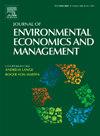可持续发展是一个动态的游戏
IF 5.9
3区 经济学
Q1 BUSINESS
Journal of Environmental Economics and Management
Pub Date : 2025-09-15
DOI:10.1016/j.jeem.2025.103238
引用次数: 0
摘要
可持续性是环境领域的一个基本概念,但也适用于其他领域,例如个人健康。可持续性意味着以不损害未来资源可用性的方式利用今天的资源。我们提出并测试了一个包含可持续性基本特征的模型。首先,我们的可持续发展游戏是动态的,因为每个时期的行为都会对未来的时期产生影响。其次,为了维持资源水平,必须达到一个贡献阈值,同时可以吸收一些资源的使用。第三,当涉及不止一个人时,过度使用资源的诱惑是很强的。我们首先分析得出平衡行为,然后在实验室中测试这些预注册的预测。我们的主要研究结果如下:(1)理论和实验上,战略互动减少了合作行为,破坏了可持续性。(ii)从理论上和实验上看,降低阈值有利于促进合作行为(即根据阈值作出贡献)和可持续性。我们的研究结果表明,降低可持续性门槛的技术进步和可持续性行为改变不应被视为替代,而应被视为互补。本文章由计算机程序翻译,如有差异,请以英文原文为准。
Sustainability as a dynamic game
Sustainability is a fundamental concept in the environmental domain, but also in other domains, e.g., regarding personal health. Sustainability means using resources today in a way that does not compromise the availability of resources tomorrow. We propose and test a model that incorporates the essential features of sustainability. First, our Sustainability Game is dynamic in the sense that the actions played in each period have consequences for future periods. Second, there is a contribution threshold that must be reached in order to maintain the level of resources, while some use of resources can be absorbed. Third, it incorporates that the temptation to over-use resources is strong when more than one individual is involved. We first derive equilibrium behavior analytically and then test these pre-registered predictions in the lab. Our main results are the following: (i) Theoretically and experimentally, strategic interaction reduces cooperative behavior and undermines sustainability. (ii) Theoretically and experimentally, lowering the threshold fosters cooperative behavior (i.e., contributing according to the threshold) and sustainability. Our results suggest that technological advancements that lower the threshold for sustainability and behavior change toward sustainability need not be viewed as alternatives, but rather as complementary.
求助全文
通过发布文献求助,成功后即可免费获取论文全文。
去求助
来源期刊
CiteScore
8.00
自引率
4.30%
发文量
91
期刊介绍:
The Journal of Environmental Economics and Management publishes theoretical and empirical papers devoted to specific natural resources and environmental issues. For consideration, papers should (1) contain a substantial element embodying the linkage between economic systems and environmental and natural resources systems or (2) be of substantial importance in understanding the management and/or social control of the economy in its relations with the natural environment. Although the general orientation of the journal is toward economics, interdisciplinary papers by researchers in other fields of interest to resource and environmental economists will be welcomed.

 求助内容:
求助内容: 应助结果提醒方式:
应助结果提醒方式:


